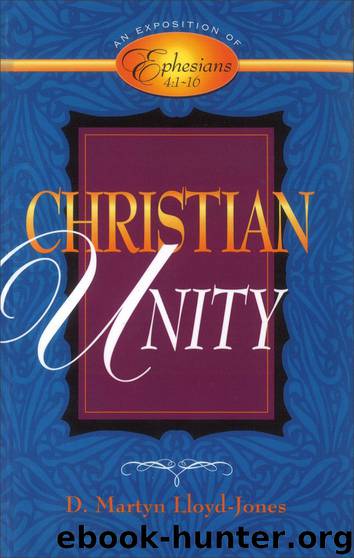Christian Unity: An Exposition of Ephesians 4:1-16 by D. Martyn Lloyd-Jones

Author:D. Martyn Lloyd-Jones [Lloyd-Jones, D. Martyn]
Language: eng
Format: epub
Tags: Christian Books & Bibles, Bible Study & Reference, Bible Study, New Testament, Paul's Letters, Humanities, Religious Studies, Religion & Spirituality
ISBN: 9780801057977
Amazon: 0801057973
Barnesnoble: 0801057973
Goodreads: 1923102
Publisher: Baker Books
Published: 1979-12-31T22:00:00+00:00
Although this great statement starts with the disjunctive word ‘but’, it is obvious that the subject with which it deals is related very closely to the one with which we have been dealing. In other words, ‘but’ is, after all, a conjunction. It implies a contrast, but at the same time it refers us back to that which has gone before. Clearly the Apostle is still continuing with the subject of the unity of the church; he is still working out the exhortation to ‘maintain the unity of the Spirit in the bond of peace’. But he is now going to do so in a slightly different manner; he is going to look at another aspect of the subject. That is why he employs this particular word ‘but’. It is essential that he should do this, for had he not done so there would be a very real danger of our having a false sense and conception of what this unity means.
There is always the danger of our conceiving of unity in terms of uniformity. Our tendency is to think of unity as consisting of a number of things which are absolutely identical in every single respect, with no difference at all, such as a sheet of postage stamps. But the Apostle is at pains to show us that that is not true unity, but a dull, drab uniformity. Unity, he shows, is much bigger than that, a much grander thing. Any conception of unity which equates it with uniformity detracts from the essential greatness and glory of unity. In other words unity is not something mechanical; it does not mean sameness. It is very difficult for us, living at the present time, to grasp this point. We are accustomed to mass-production—articles coming out of a machine one after another, all exactly the same. And they are meant to be identical. This is not only true of machinery and manufactured goods, there are obvious tendencies in the world today to think in the same manner of human beings. This is not entirely new; it has characterized certain educational establishments which have produced a mass product, a distinct type of individuals, all of whom conform to the same behaviour pattern in deportment and speech and other respects. Each one has the stamp upon him, and one is more aware of the type than of the individual himself, except in certain unusual individuals. This is not surprising, because the herd-instinct is powerful in all of us by nature. The Apostle discountenances this notion and shows that unity is something living and vital, something which is almost staggering in its variety. This indeed is the very special and most glorious aspect of spiritual unity. Let us follow the Apostle as he works out this principle.
In studying verses 4, 5 and 6 we saw that the Apostle uses the word ‘one’ seven times—‘one Spirit, one body, one hope of your calling, one Lord, one faith, one baptism, one God and Father of all’, and thereby establishes the great principle of unity.
Download
This site does not store any files on its server. We only index and link to content provided by other sites. Please contact the content providers to delete copyright contents if any and email us, we'll remove relevant links or contents immediately.
| Guides | New Testament |
| Old Testament |
The Five People You Meet in Heaven by Mitch Albom(3569)
The Secret Power of Speaking God's Word by Joyce Meyer(3220)
Real Sex by Lauren F. Winner(3023)
Name Book, The: Over 10,000 Names--Their Meanings, Origins, and Spiritual Significance by Astoria Dorothy(2987)
The Holy Spirit by Billy Graham(2953)
0041152001443424520 .pdf by Unknown(2846)
How The Mind Works by Steven Pinker(2816)
ESV Study Bible by Crossway(2778)
Ancient Worlds by Michael Scott(2688)
Churchill by Paul Johnson(2587)
The Meaning of the Library by unknow(2572)
The ESV Study Bible by Crossway Bibles(2551)
The Gnostic Gospels by Pagels Elaine(2531)
MOSES THE EGYPTIAN by Jan Assmann(2417)
Jesus by Paul Johnson(2363)
City of Stairs by Robert Jackson Bennett(2354)
The Complete Dead Sea Scrolls in English (7th Edition) (Penguin Classics) by Geza Vermes(2283)
The Nativity by Geza Vermes(2231)
Ancient Near Eastern Thought and the Old Testament by John H. Walton(2226)
